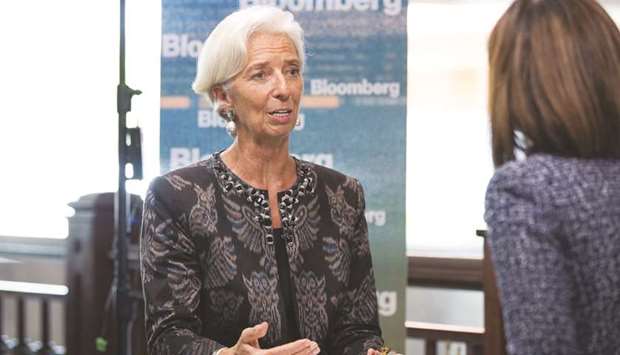Global finance chiefs used the closing sessions of talks in the tropical resort of Bali to hammer home the message that simmering trade tensions are already denting global growth and need to be resolved.
Bank of Japan governor Haruhiko Kuroda said it’s essential to have dialogue on trade; Brazil’s central bank President Ilan Goldfajn flagged the tensions as one of the biggest threats to emerging economies; Bank for International Settlements general manager Agustin Carstens said there’s a risk the global economy goes backwards due to rising protectionism.
While People’s Bank of China Governor Yi Gang called for a constructive solution to the dispute — he added that China is preparing for the worst.
“You see a lot of people in China now preparing for this trade tension to be a prolonged situation,” Yi said during a panel discussion hosted by the Group of Thirty, a consultative group on international economics. “The downside risks from trade tensions are significant.”
The Chinese official received support from the floor when Mexico’s former president Ernesto Zedillo took an opportunity during a question-and-answer session to counsel Yi to follow the example set by Mexico and Canada during their Nafta negotiations with the US.
“Mexico and Canada made clear that they’d rather not have Nafta than having the deal that the US wanted. In the end, Mexico and Canada got their way in every single issue that had been drawn as a red line,” Zedillo said. “So I hope China doesn’t blink.”
IMF managing director Christine Lagarde doubled down on the messaging.
“Our message was very clear: de-escalate the tensions,” she told Bloomberg Television in an interview.
The Sunday blitz came as the IMF and World Bank’s annual meetings wound up. Warnings over the tensions were put in the starkest terms on Friday by Indonesia President Jokowi Widodo, who channelled the hit TV Series Game of Thrones to say “winter is coming” for the world economy if there’s no breakthrough.
The IMF’s main policy-advisory panel warned Saturday that the global recovery is increasingly uneven and risks are being skewed to the downside.
While the world expansion remains strong, the outlook is being clouded by “heightened trade tensions and ongoing geopolitical concerns, with tighter financial conditions particularly affecting many emerging market and developing countries,” said the International Monetary and Financial Committee, a 24-member panel that advises the fund on policy issues. Policy makers also warned on the impact of rising interest rates and market volatility. Officials from emerging economies said the Federal Reserve’s ongoing push to raise interest rates was causing pain.
Indonesia’s central bank governor Perry Warjiyo, faced with a tumbling currency amid the rout in emerging markets, has called for global monetary policy to be better synchronised and a multilateral response to protectionist headwinds. Officials in Colombia and Mexico also warned of strains during the week’s meetings. Still, Brazil’s Goldfajn said emerging markets “should not complain about normalisation” because the gradual moves will help prevent the need for sudden changes later on.
As officials left Bali, there was little prospect of any resolution to the US-China trade dispute in sight.
“We are moving from synchronised growth to economic divergence,” said Bank of France governor Francois Villeroy de Galhau.

IMF MD Christine Lagarde speaks during a Bloomberg Television interview on the sidelines at the IMF and World Bank Group Annual Meetings in Nusa Dua, Bali, yesterday. u201cOur message was very clear: de-escalate the tensions,u201d she said.
